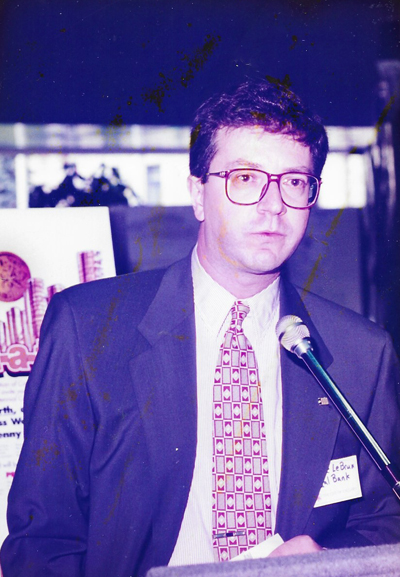Pierre LeBrun’s belated and unlikely path to McGill’s business school started with a trip to the unemployment bureau. When LeBrun, BCom’72, graduated from high school in Quebec City in 1965, his father, who had been a military police officer, drove him there to find a job.
“My dad was big, burly and rough, and he wouldn’t stand for me being lazy and doing nothing that summer. Through pure luck there was a position open for a junior clerk at the Royal Bank of Canada (RBC). I hadn’t heard of the Royal – I thought it was the post office. But I got the job, and some of my duties were to oil the vault door and set traps for rats in the basement. My dad was really happy,” recalls LeBrun, who progressed from junior clerk to teller, and was then promoted to a junior position as third assistant accountant in a Montreal branch.
As LeBrun matured and gained banking experience over the next few years, his thoughts turned to the future and doors that could open the way to greater career advancement. “I realized I might want to go back to school. I had no money, my parents had no money, and there was no way I could go to university without financial help. But I had heard about the bank’s Muir university scholarship for employees. Much to my surprise I got it,” he says.
Education edge: on the management fast track
 The generous scholarship, named after former RBC president and chairman James Muir, gave LeBrun the financial freedom to make the most of his McGill experience. “I was paid a full salary for going to university and I accumulated years of service while at university that went towards my pension. I was also able to live in my own apartment on Sainte-Catherine Street in downtown Montreal because I had a salary, while my friends were living in dorms. It was a terrific deal,” says LeBrun, who entered the second year of the BCom program in 1969 at the age of 22.
The generous scholarship, named after former RBC president and chairman James Muir, gave LeBrun the financial freedom to make the most of his McGill experience. “I was paid a full salary for going to university and I accumulated years of service while at university that went towards my pension. I was also able to live in my own apartment on Sainte-Catherine Street in downtown Montreal because I had a salary, while my friends were living in dorms. It was a terrific deal,” says LeBrun, who entered the second year of the BCom program in 1969 at the age of 22.
The practical career advantages of a higher education were obvious too. “Back then few people in banking had degrees. I knew I was reasonably smart, and the degree was an honour that set me apart. When I graduated from McGill, I was promoted to assistant branch manager in a credit-related position and I knew I was on a path, which was unusual for a French-Canadian then,” he says.
The educational, social, and cultural experience of attending McGill and living in downtown Montreal was transformative for LeBrun, who had first learned English (and German) when his family lived for three years at a Canadian Forces base in Germany during his early teens. “There is no question my three years at McGill were three of the best years in my life. I enjoyed the school, the friendships, and the atmosphere at McGill and in downtown Montreal,” he says.
Paying it forward as a young grad
In the mid-70s, he began making annual donations to support McGill students, which he has continued to do for 47 consecutive years. “Even though I was still young and foolish, I realized I had been given a privilege few others had and here was a chance to pay it forward. I felt it was right that I give a little back,” explains LeBrun, who gradually increased the amount of his annual giving through the course of his career at RBC, where he rose to become a senior vice-president, and continued his support after retiring.
The annual gifts that donors like LeBrun give loyally each year provide a vital, flexible source of funding to support the Desautels Faculty of Management’s emerging and evolving student education needs. This academic year, for example, the Faculty had a substantial need to support unexpected software and hardware costs for Desautels students, staff, and professors in providing remote instruction. These donor funds support everything from a teaching and learning specialist to advise professors on how they can effectively deliver courses remotely, to providing the adequate software for teaching and career services, to boosting the technology needed to work remotely, including the number of laptop and quality microphones.
Higher education for ransom
When LeBrun returned to banking after graduating in 1972, he performed well in his new position as assistant branch manager in a tiny town south of Quebec City. “I did a really good job assessing credit applications and that door opened substantially because I’d gone to McGill. The branch manager relied on me and asked me questions because I spoke English and used big words. This was important because the credit applications had to be done in English,” recalls LeBrun, who was keen to further advance his education and career.
He applied for a second Muir scholarship to earn an MBA at University of British Columbia and experience west coast living. LeBrun’s application was turned down because his position wasn’t senior enough. “I quit. Then the bank came back and said, if you don’t quit, we’ll give you a scholarship in a year and, in the meantime, promote you to the level where you qualify,” says LeBrun, who was promoted to assistant manager at a big branch in Montreal and awarded a full-salary scholarship. “I was told years later that I held the bank for ransom — but I just wanted to go back to university and get my MBA.”
Moving upward from coast to coast
Over the next 25 years, LeBrun rose through the ranks in managerial and executive positions at RBC in diverse areas of banking ranging from retail and commercial to operations, internal audits, and networks in many locations from coast to coast. “There were no drawbacks for me to living and working in different cities and provinces across Canada. I got married in Montreal, my daughter was born in Alberta, and my son in Nova Scotia. I liked the variety and there was always something new: new jobs, new environments, new homes, and everything was taken care of by the bank,” he says.
LeBrun’s easy adaptability and appetite for embracing new challenges and experiences arose from his three formative years as a teen living in Germany. “Unlike many of his military peers, my dad took advantage of the opportunity for us to see Europe as a family. We travelled to Italy, France, Spain, Portugal, the former Yugoslavia, and most other countries except for those in Eastern Europe where we weren’t allowed to go. That opened my world. When I look back at my early years, moving to Germany was one of two life-changing events and the other was going to McGill,” he says.
Wherever he lived and worked in Canada, the affable and gregarious banker got to know the people and the places in that province. “When I was head of internal audits for Alberta, I visited the whole province from Ft. McMurray to Lethbridge. Calgary became my second favourite city after Montreal. As an area manager for retail banking in Nova Scotia, I travelled all over the province. I enjoyed every job I had except for one instance when I had a boss with whom I had serious ongoing conflicts. But he was let go and replaced by the best boss I ever had,” says LeBrun, who became in 1996 a senior vice-president of network development and then operations before retiring in 2000, at 53, with a full pension.
Legacy giving to support Desautels students
LeBrun adapted well to the more relaxed pace of retirement after logging in 14-hour days in his final years as a senior banking executive. “In 2000, retirement allowed me to buy a Cobra, an old race car, and become a mechanic. I didn’t know how to change a wheel when I started. I enjoyed working on the car more than driving it and sold the Cobra for more than I paid 15 years later,” says LeBrun, who also volunteered for many years driving cancer patients to and from McGill University Health Centre’s Royal Victoria Hospital and the Jewish General Hospital.

In 2019, LeBrun chose to make a bequest to McGill’s Desautels Faculty of Management that ensures his legacy of annual giving for nearly five decades will continue through McGill’s third century. He made a legacy gift to the Desautels Dean’s Legacy Fund through a charitable gift annuity, which will generate funds to support students’ emerging and most pressing needs on an annual basis in perpetuity.
“I have two adult children, who are both doing well in their careers and don’t need financial support. At this stage in my life, a bequest through a charitable gift annuity was an excellent way for me to give some money to pay it forward to McGill students well beyond my lifetime. I made an initial gift of capital and I get income at a good rate of return each year. The income I receive is mostly tax-free, and the money I donated will go to McGill after I die,” explains LeBrun, who is 73.
LeBrun was the inaugural donor for the Desautels Dean’s Legacy Fund, an endowed fund being built at the Faculty to help ensure that annual giving by alumni can continue even after they are no longer alive. His example has prompted other Desautels alumni to come forward and contribute to the Dean’s Legacy Fund as well.
“McGill changed the course of my life and career unquestionably, and because of that I became quite well off. The scholarships I got for university were extremely generous. I feel it’s only right and proper for me and for others, who may have benefited in similar ways, to give back if you can,” says LeBrun.


